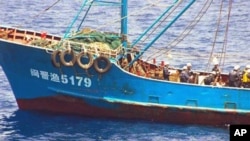Japan has rejected China's demand for an apology and compensation for holding a Chinese fishing boat captain for more than two weeks.
Several hours after Japan released the captain Saturday, China's Foreign Ministry issued a statement calling the captain's detention unlawful and asking Japan to apologize.
Japan's Foreign Ministry called the demand groundless and unacceptable.
The Chinese captain had been held since his fishing boat collided with two Japanese patrol boats near a group of islands claimed by both China and Japan.
Japanese prosecutors cited the deepening rift between Beijing and Tokyo in their decision to release Captain Zhan Qixiong.
After arriving back in China on a chartered airplane Saturday, Zhan said he firmly supports the Chinese government's position and that he did nothing illegal.
The dispute took diplomatic relations between China and Japan to their lowest level in years.
China had suspended ministerial-level contacts and canceled planned meetings with Japan while demanding Zhan's release.
Some in the Japanese media criticized Tokyo's decision to free the captain as giving in to Chinese pressure.
A U.S. State Department spokesman welcomed the decision to release the captain and said he hoped it would ease tensions between the Asian neighbors.
In New York, where world leaders are meeting for the U.N. General Assembly, Japanese Prime Minister Naoto Kan said Japan and China are important neighbors with key responsibilities and must cooperate with one another.
The chain of islands at the center of the dispute -- called Diaoyu by China and Senkaku by Japan -- are uninhabited. But the waters around them are rich fishing territory and are believed to hold undersea natural gas and oil reserves.
In another source of tension, China has detained four Japanese nationals suspected of illegally filming military targets in the country.
Japanese diplomats visited Saturday with the workers, who were preparing a bid on a project to dispose of chemical weapons left in China by the Japanese during World War II.
Some information for this report was provided by AP and Reuters.




